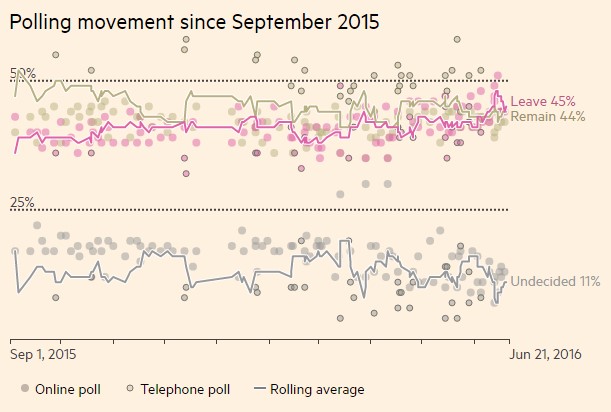In the final days before the referendum on Britain leaving the EU, poll numbers show the “leave” and “remain” sides in a dead heat. The Financial Times Brexit poll of polls has “leave” at 45 percent support and “remain” at 44 percent, having gotten a boost after the assassination last week of Labour Party Member of Parliament Jo Cox.

Source: The Financial Times
The outcome on Thursday could hinge on young voters.
Related: Brexit Explained: What It Is and How It Could Change the World
Polling data shows that among Britons, the tendency to be Euroskeptic increases with age, with support for leaving the EU increasing to 58 percent for the 65-plus age group. By contrast, Britain’s 14 million millennials have shown consistent support for the “remain” side.
An ICM poll conducted two weeks ago broke down voting intentions by age category. It found that among British people aged 18 to 34, 52 percent wanted to remain in the EU and 36 percent favored leaving.
“I’m very passionate we should remain in the EU,” said Tom Cridland, the 25-year-old founder of a sustainable menswear company. “It’s not that I don’t respect the people who want to leave the EU — they only want what’s right for their country — but I think it’s going to be damaging for those who rely on exporting to the EU.”
Cridland founded his business two years ago after receiving a £6,000 ($8,800) start-up loan from the British government. Since then, the company’s “buy less, buy better” philosophy has won acclaim among fashion industry watchers and even movie stars. Central to Cridland’s business model is keeping the clothing affordable by ensuring a minimal markup. While he runs operations out of the U.K., his manufacturing plant is in Portugal, which allows him to move goods from the production center to other EU locations without tariffs.
If Britain leaves the EU, Cridland said he fears that the uncertainty could cause significant harm to small businesses like his, which could amount to tens of thousands of pounds lost.
“The immediate impact would be devastating for a lot of businesses, and the damage may be irreversible by the time a trade deal is negotiated,” he said.
Related: How a Brexit Could Sink Clinton and Hand the Election to Trump
To Cridland, who is half Portuguese, an exit from the EU could have a significant human impact as well. “It’s going to affect a lot of human beings’ lives,” he said. “EU nationals who come over to this country work very hard doing jobs for the British public.”
He said he worries the “remain” campaign has not been passionate enough, sentiments echoed by some commentators who argue that the Labour Party could have done more to drum up support.
“This decision is far too serious to be treated as another act in a Tory psychodrama and much more attention ought to be paid to non-Conservative voices in the days remaining before the vote,” wrote Andrew Rawnsley in The Guardian.
Given how close the polling numbers are, young people have been encouraged to lobby older relatives.
“The youth have a strong role to paly in convincing their elders — sitting down at home with their grandpa who says, ‘I want my Britain back and explaining that the Britain of the future is not the Britain of the past,’” said 22-year-old Bristol University law student Pouyan Maleki-Dizaji, who has been active in the “remain” campaign.
But for campaigners on either side, the biggest challenge is encouraging the young to exercise their right to vote. Young people have traditionally voted in lower numbers, and data from the last British general election shows that despite voter turnout being 66 percent overall, just 43 percent of voters aged 18 to 24 and 54 percent of voters in the 25 to 34 category cast ballots.
Younger “leave” campaigners have also looked to increase youth support by focusing on positive messaging. Youth-focused Campaign BeLeave’s Facebook page has focused on jobs, and reinforcing the view that Britain can remain open to the world even in the aftermath of a Brexit.
However, many millennials apparently aren’t focused on the referendum, questioning why it’s necessary, wrote Vicky Spratt in The Spectator earlier this month. Concerned with “bigger fish to fry,” Spratt argues that they are more attuned to daily challenges like finding a job and affording the rent.
Related: How a Ban on Tea Kettles Could Drive Britain to a Brexit
“We grew up as part of Europe — it’s not something we’ve ever had to consider. In fact, we are pretty sick of hearing this debate and, to be frank, we don’t really understand why we’re having it,” she wrote. “Many of us are rather baffled that we’re having this conversation about leaving the EU full stop.”
Still, Maleki-Dizaji said he hopes the consequences of the Brexit vote will encourage more young people to participate in the referendum.
“People understand that this isn’t your typical council election, and they understand that this vote is of huge significance.”
The referendum on Britain’s continued membership in the EU will take place on Thursday.




